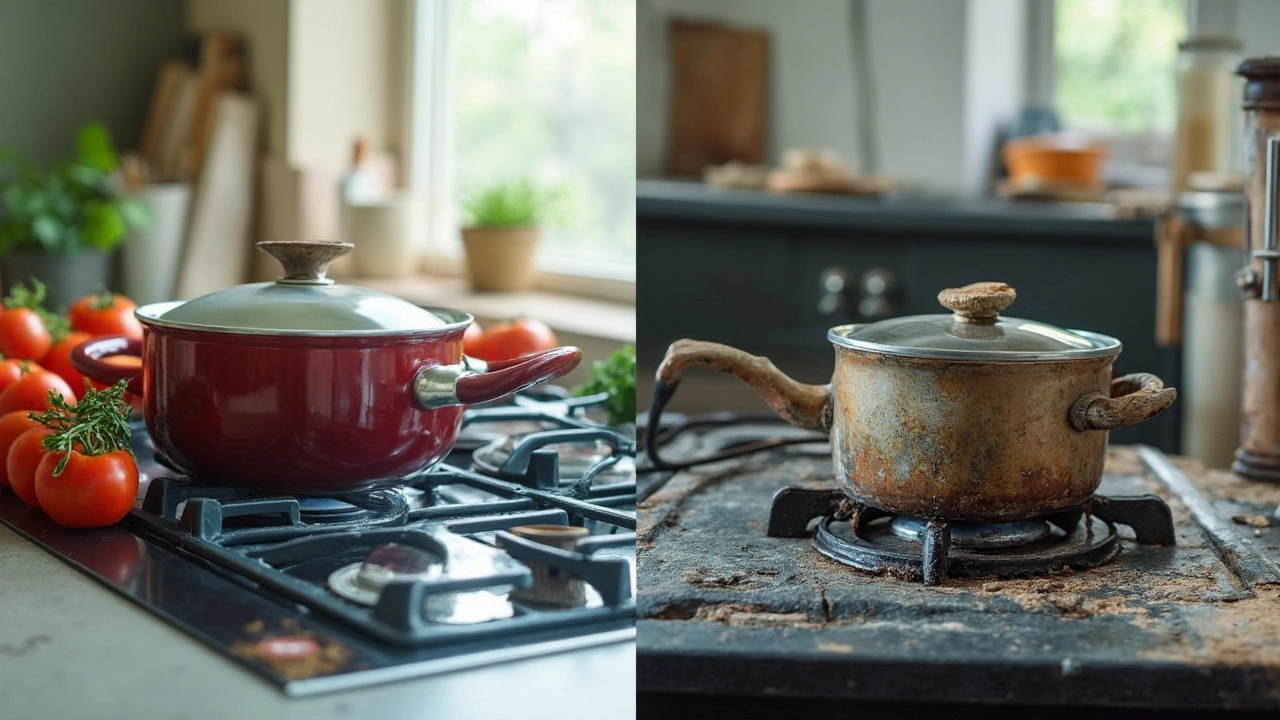Ever looked at your cooker and wondered if it's time for a new one? If you have, you're not alone. The average lifespan of a cooker is around 13 to 15 years, but this can change based on how often and how well you maintain it. Cookers are a big part of our daily routine, handling everything from simple scrambled eggs to lavish dinner parties.
So, how do you know when to replace it? Look for signs like irregular heating, strange noises, or if repairs are becoming a regular thing. If it's older than 15 years and giving you grief, you might save money in the long run by getting a new one.
- Understanding Cooker Lifespan
- Identifying Wear and Tear
- Signs It's Time to Replace
- Repair vs Replace: Making the Call
- Extending Your Cooker's Life
- Eco-Friendly Disposal Tips
Understanding Cooker Lifespan
Thinking about how long your cooker will last can save you some unexpected headaches down the line. On average, a good quality cooker can last between 13 to 15 years. Yet, this varies greatly depending on how often it's used and how well you take care of it. The materials and brand quality make a difference too!
Dr. George Langley, a household appliance expert, says,
"A regularly maintained cooker can outlive its typical lifespan by several years, whereas neglecting simple care can chop that time in half."
Regular use means you'll see wear and tear over time. Common issues like burners not igniting properly or temperature inconsistencies could signal that parts of your beloved cooker are wearing out.
But here's some good news. If parts go bad, you don't always need to get a whole new cooker. Replacing individual components like knobs or burners might be the ticket.
Factors Influencing Lifespan
- Cooker Quality: Higher quality often equates to a longer lifespan.
- Usage Frequency: More usage means quicker wear, simple as that.
- Maintenance Routine: Regular cleaning and repairs can extend life.
It's important to weigh these factors when considering whether to replace or repair. Keeping track of age and performance will give you a head start in deciding when your cooker might need an upgrade.
Identifying Wear and Tear
Let's get real: over time, even the best cookers start showing their age. It's not magic; it's just the wear and tear from keeping up with all your culinary adventures. So, how can you spot the signs that your trusty appliance might be running out of steam?
Irregular Heating
The first thing you'll notice might be uneven cooking. If your casserole comes out hot in some spots and cold in others, it's time to consider checking the heating elements. This is a classic sign that parts of your cooker are aging and might need attention.
Noises You Can't Ignore
Strange sounds are like your cooker speaking to you in a language we all dread to understand. Clicking, buzzing, or any sound that's out of the norm can signal issues with internal components, like the fan or motor.
Frequent Repairs
If you're calling the repair service more frequently than you're using the appliance, it might be a red flag. Multiple small repairs can add up, and sometimes, a replacement might be more economical in the long run. Keep a record of how often you're fixing it; if it's more than twice a year, take a closer look.
- Check the control knobs for looseness
- Inspect for any visible cracks or rust
- Examine the glass door for any chips or damage
Energy Efficiency
Let's talk about the power bill. If it's skyrocketing, your kitchen appliances like the cooker might be guzzling more energy due to inefficiency. Older models consume more energy, translating to higher bills.
Safety Hazards
Any kind of sparking, smoke, or burning smell is a critical warning sign. Don't ignore it since it could mean serious electrical issues. Safety should always come first, and these are alarms you need to heed.
Identifying wear and tear early on ensures your cooker replacement decisions are based on necessity rather than urgency. Keep an eye out for these signs, and you'll be better prepared on when to pull the plug or go for that quick repair.
Signs It's Time to Replace
Wondering whether it's time to part ways with your trusty cooker? There are definitely some telltale signs that suggest it might be time to upgrade or replace your kitchen companion.
Performance Issues
If you notice your meals aren't cooking evenly or if certain burners are failing to ignite, these are big red flags. Irregular heating can turn dinner prep into a frustrating guesswork. Sometimes, despite cleaning and repairs, these issues persist, hinting that a new cooker replacement could save you a lot of hassle.
Repeated Repairs
Another clue? When you're best buddies with your repair technician. If your cooker requires constant attention, you're spending money that could be better used investing in a new one. Using older kitchen appliances that are constantly in and out of service may not be cost-effective.
Age Matters
Think about the age of your cooker. Although kitchen maintenance can extend a cooker's life, appliances over 15 years old often lack the efficiency and features of newer models. If yours is reaching this age, it’s worth contemplating a replacement even if it’s still ticking.
Space and Technology Needs
Do you find yourself daydreaming about updated tech or more space? Newer cookers come with advanced features like induction cooking, Wi-Fi capability, or extra burners, which can upgrade your cooking game. Plus, if your family has grown, a larger appliance might be more suitable.
Safety Concerns
Last but definitely not least, consider safety. If you observe gas smells or flickering pilot lights, skip the repair route and opt for a new appliance. Safety is non-negotiable when it comes to gas cooker repair issues.

Repair vs Replace: Making the Call
Deciding whether to repair or replace your cooker can feel like you're playing a game of kitchen roulette. But don't worry, there are some clear clues to help you out. Let's break it down.
First off, consider the age of your appliance. A cooker that’s over 15 years might be living on borrowed time. If it's nearing that mark and you've already spent some cash on repairs, then it could be time to think about a new one. Remember, those small repairs can add up fast.
Cost Analysis
Here's a handy tip: if the cost of repair is more than 50% of the price of a new cooker, replacement might be the smarter move. Consider not only the upfront price but also efficiency savings that a newer model could offer.
Performance and Safety
Is your cooker not heating evenly or taking too long to cook meals? These aren't just annoying issues—they can be early signs of a bigger problem. Safety is key, too. If you smell gas or notice electrical issues, those are instant red flags. In such cases, it's better to take the safer route and replace.
Environmental Impact
Nowadays, sustainability is on everyone's mind. Newer cookers are generally more energy-efficient, so while there's an added cost at first, you save on utilities over time. Plus, you earn some green points by reducing your carbon footprint.
Before making the final call, check your warranty. Sometimes repair services are covered, softening the financial blow. Weigh your options carefully, and don't hesitate to consult a professional if you're unsure.
Extending Your Cooker's Life
Keeping your cooker in good shape isn't just good for your wallet; it's also great for the environment. Regular maintenance can add years to its lifespan, saving you the hassle of constant repairs or an early replacement.
Regular Cleaning
Probably the simplest step, but also the most overlooked. Make it a habit to clean your cooker after every use. Grease and food particles can build up, affecting performance and even causing damage over time.
- Use a soft cloth and mild detergent for regular cleaning.
- For stubborn stains, a mixture of baking soda and vinegar can work wonders.
- Don't forget to clean the knobs and switches, as grime can mess with their functionality.
Check the Burners and Elements
Burners and heating elements work hard to cook your meals, so give them a once-over every few weeks. Look for signs of wear or damage and make sure they're properly aligned.
- Electric burner not heating properly? It might be time to replace the element.
- Gas burner giving a weak flame? A quick clean with a toothbrush might fix it.
Inspecting Gas Lines and Connections
If you have a gas cooker, regularly checking the gas lines for leaks or damage is critical. Using a simple soapy water solution on the lines can help detect any leaks; if you see bubbles, you've got a problem.
Annual Professional Check-up
Just like a car, sometimes it's best left to the professionals. An annual once-over by a qualified technician can spot potential issues before they become major problems.
The technician can also help re-calibrate any settings, ensuring your cooker operates at peak efficiency.
Mind the Surroundings
Little things, like ensuring proper ventilation and giving your cooker some breathing room, can make a big difference. Ensure there's enough space for heat to escape and avoid storing items on top of it, which can trap heat.
Cookers are long-term investments, and a little care can keep them running like new for years. What's more, by avoiding frequent replacements, you're also making an eco-friendly choice. Happy cooking!
Eco-Friendly Disposal Tips
Thinking about tossing out your old cooker? Hold up! Before you drag it to the curb, there are eco-friendly ways to get rid of it that can be beneficial for both the environment and your pocket. Here's how.
1. Recycle Your Cooker
Most kitchen appliances are made of recyclable materials, like steel and glass. Find a local recycling center that takes old appliances. Not only will you be doing Mother Earth a solid, but some places might even give you a little cash for your trouble.
2. Donate if Still Working
If your cooker is still working but just isn’t suited for you anymore, consider donating it. Charities or thrift stores often accept used appliances, and your old cooker could be a major upgrade for someone else.
3. Check for Take-Back Programs
Certain brands and retailers offer take-back or exchange programs. When buying a new kitchen appliance, ask if they take back the old one. It's a great way to ensure proper disposal and sometimes score a discount on your purchase.
4. Upcycle Parts
For those who enjoy a DIY project, consider upcycling parts. Oven racks make great shelving units, and knobs can become quirky hooks. Get creative!
5. Professional Disposal Services
If the above options don't suit you, look for a professional appliance disposal service. They ensure your cooker is disposed of properly and often recycle parts in the process.
Here's a quick look at the recycling potential for common kitchen appliance materials:
| Material | Recyclable Percentage |
|---|---|
| Steel | 90% |
| Glass | 100% |
| Plastic Components | 60% |
In the end, disposing of an old cooker doesn’t have to be a hassle. These options not only help the environment but also can make you feel good about doing the right thing!
